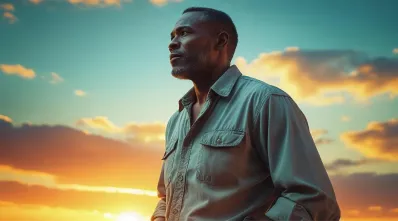
Finding Your Why After Service
Beyond the DD-214: Finding Your New 'Why' After Service
You have your DD-214 in hand. For years, this document symbolized the finish line—the end of drills, deployments, and command structures. But now that you've crossed it, the silence on the other side can be deafening. The mission is over. So, what's next?
For many veterans, the transition to civilian life brings an unexpected identity crisis. The sense of purpose that defined your every day in the service can feel like it vanished overnight. If you're struggling with finding purpose after military service, know this: you are not alone, and this is not a final destination. It's the beginning of your next, and most personal, mission.
The Transition Challenge: From Clear Mission to Uncharted Territory
In the military, your "why" was clear. It was in the uniform, the camaraderie, the defense of your country, and the role you played in a unit that was bigger than yourself. Civilian life often lacks that built-in structure and shared purpose, leading to common challenges for veterans:
A Loss of Identity: You're no longer "Sergeant" or "Petty Officer." So, who are you?
A Lack of Community: The tight-knit "squad" is replaced by neighbors and coworkers who may not understand your experiences.
A Search for Meaning: A civilian job, even a good one, can feel hollow if it doesn't connect to a deeper sense of purpose.
This journey is about more than finding a new job. It's about rediscovering who you are and what drives you. It’s about finding your new "why."
4 Steps to Discovering Your Purpose After the Military
Finding your new mission requires a deliberate, conscious effort. Think of it as a new operation, with you as the commander. Here are four actionable steps to get started.
1. Conduct a Personal 'After-Action Review' (AAR)
In the service, an AAR helps you analyze what happened, why it happened, and how to improve. Apply this to your life. Get a notebook and be brutally honest.
What did you love about your military service? (The leadership? The structure? The physical challenge? The technical skills?)
What did you dislike? (The bureaucracy? The time away from family?)
Outside of work, what activities make you feel alive? (Hobbies, volunteering, learning something new?)
What values are non-negotiable for you? (Integrity, service to others, loyalty, security?)
This isn't about finding a job description. It’s about uncovering the core components of what makes you, you.
2. Translate Your Values, Not Just Your Skills
Civilian employers want your skills, but a fulfilling life requires you to live by your values. You've already proven you have leadership, discipline, and integrity. The question now is: where can you apply those values?
If service to others was your driving force, look for careers in non-profits, teaching, healthcare, or civil service. If you thrived on solving complex problems, look at fields like project management, logistics, or engineering. Frame your search around what fulfills you, not just what your MOS or AFSC qualifies you for.
3. Find Your New Squad
Community is critical for life after military service. The isolation many veterans feel is one of the biggest hurdles to a healthy transition. You need to proactively build a new support system.
Veteran Groups: Connect with local chapters of the VFW, American Legion, or Team Rubicon. These are people who speak your language.
Hobby-Based Groups: Join a local hiking club, sports league, or workshop. Shared interests are a powerful way to build new bonds.
Professional Networking: Use platforms like LinkedIn to find other veterans in your desired career field. They can provide invaluable mentorship and guidance.
4. Embrace a Trial-and-Error Mission
Your first attempt at a new career or hobby might not be the right fit, and that's okay. Civilian life offers a flexibility the military doesn't. Give yourself permission to try something, learn from it, and pivot if needed.
See every new experience—a class, a volunteer day, a coffee meeting—as intel-gathering for your primary mission: building a life you are proud to lead.
Your Next Mission Starts Now
Your service didn't end with the DD-214; it evolved. The skills, discipline, and character you forged in the military are the exact tools you need to build a life of meaning and purpose. The mission has changed, but the warrior spirit remains.
If you are ready to define your new mission but aren't sure where to begin, we are here to help. At Dr. Harris Veterans Resource, we specialize in helping veterans navigate this exact challenge.
Take the first step. Complete our free "Understanding Your New Mission" assessment today and gain the clarity you need to move forward with purpose and confidence.
